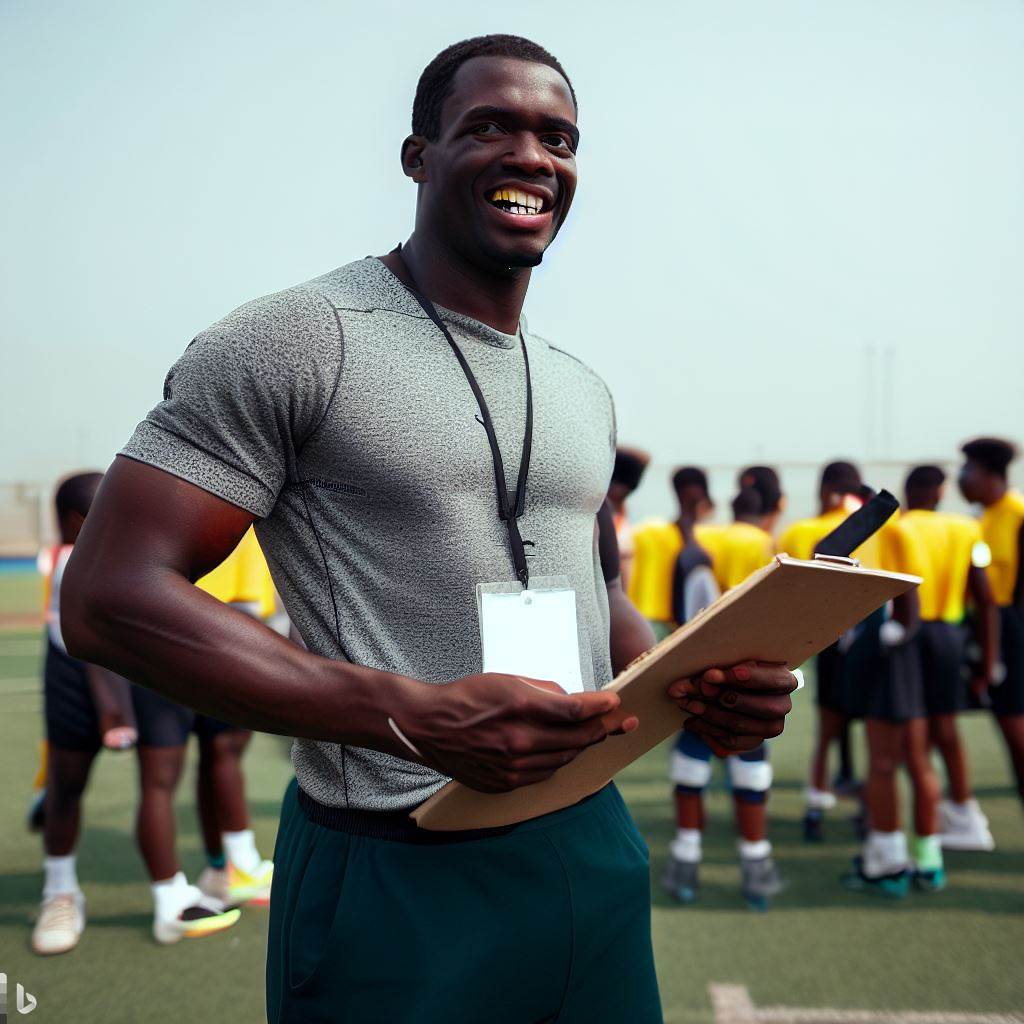Introduction
An Athletic Director in Nigeria plays a crucial role in overseeing all athletic activities within an educational institution or sports organization.
Understanding and navigating regulations is essential in fulfilling this role effectively.
With a diverse range of sports and athletic programs, an Athletic Director’s responsibilities encompass managing teams, organizing competitions, and ensuring compliance with local and international standards.
Additionally, they have to coordinate with coaches, athletes, and administrative staff to provide the best possible environment for sports development.
Navigating regulations is vital because it ensures that all activities and operations align with legal requirements and promote fair play.
By understanding and staying updated on the regulations, an Athletic Director can uphold integrity and maintain ethical practices in their organization.
They must be knowledgeable about rules regarding student-athlete academic progress, financial aid, and transfers to maintain a level playing field.
In a dynamic country like Nigeria, regulations governing athletics are subject to change.
The Athletic Director must continually stay informed about updates to avoid penalties and protect the organization’s reputation.
This requires regular communication with relevant sports bodies, government agencies, and educational institutions to remain compliant.
Furthermore, effective navigation of regulations can contribute to the overall growth and development of sports in Nigeria.
By working within the framework of regulations, an Athletic Director can promote transparency, accountability, and a culture of good governance.
Basically, understanding and actively navigating regulations are vital for the role of an Athletic Director in Nigeria.
By doing so, they can successfully lead and manage athletic programs while upholding integrity and compliance.
Understanding the Nigerian Sports Regulatory Landscape
As an Athletic Director in Nigeria, it is crucial to navigate the regulations that govern sports in the country.
Understanding the Nigerian sports regulatory landscape is necessary to ensure compliance and the smooth operation of athletic programs.
Overview of Nigerian sports regulatory authorities
In Nigeria, several governmental bodies are responsible for sports regulations.
These authorities play a vital role in overseeing and enforcing policies that affect athletic programs.
- The Federal Ministry of Youth and Sports Development
- Nigeria Olympic Committee (NOC)
- National Sports Commission (NSC)
- Nigeria Football Federation (NFF)
These regulatory bodies have distinct roles and responsibilities in the Nigerian sports ecosystem.
Major regulations impacting Athletic Directors
Various legislations affect sports management in Nigeria and consequently impact Athletic Directors.
- National Sports Commission Act
- Nigeria Football Federation Act
- National Institute of Sports Act
- University Sports Act
- Nigerian Anti-Doping Rules and Regulations
These regulations address different aspects of sports, including organization, governance, doping, and education.
Athletic Directors must familiarize themselves with these laws to ensure compliance and provide a conducive environment for student-athletes.
Athletic Directors are directly affected by these regulations in several ways:
- Compliance Requirements: Athletic Directors must ensure their programs adhere to the guidelines set by regulatory bodies.
- Financial Management: Sports regulations dictate financial practices, including budgets, funding, and sponsorship deals.
- Athlete Eligibility: Regulations govern the eligibility criteria for athletes to participate in sports competitions, requiring Athletic Directors to verify qualifications.
- Facility Standards: Guidelines determine the safety and quality standards for sports facilities, requiring Athletic Directors to maintain appropriate infrastructure.
- Anti-Doping Measures: Athletic Directors must enforce anti-doping policies and educate athletes on the dangers and consequences of doping.
- Sporting Event Organization: Regulations outline protocols for organizing sporting events, including permits, security, and logistics.
Navigating these regulations as an Athletic Director can be challenging, but it is essential for the successful management of sports programs in Nigeria.
Compliance ensures the integrity of sports and protects the welfare of student-athletes.
In essence, understanding the Nigerian sports regulatory landscape is fundamental for Athletic Directors in Nigeria.
The various governmental bodies responsible for sports regulations, along with the specific legislations impacting sports management, shape the environment in which Athletic Directors operate.
By adhering to these regulations, Athletic Directors can effectively lead their programs and contribute to the development of sports in Nigeria.
Read: Athletic Directors: Nigeria’s Sports Development Leaders
Challenges Faced by Athletic Directors
As an Athletic Director in Nigeria, navigating the regulatory landscape can be a daunting task.
The challenges faced in this role are multifaceted, with two key areas of concern being the lack of clarity in regulations and compliance issues.
Lack of clarity in regulations
One of the major challenges Athletic Directors face is the lack of clarity in regulations governing their field.
Ambiguous regulations create confusion and make it difficult to understand and interpret the rules.
This ambiguity can lead to inconsistencies in the application of regulations, which hampers effective decision-making and planning.
For instance, determining eligibility criteria for student-athletes can be a complex process.
Unclear regulations regarding age limits, academic requirements, and amateur status make it challenging for Athletic Directors to ensure fair and equal opportunities for all athletes.
Similarly, managing sponsorship agreements becomes problematic when regulations regarding endorsements and advertising are vague or contradictory.
Compliance issues
Ensuring compliance with regulations is crucial for Athletic Directors, as non-compliance can have severe consequences.
Violations can result in fines, sanctions, and even the suspension of athletic programs.
Furthermore, non-compliance tarnishes the reputation of the institution and the athletic department, which can have long-lasting negative effects.
The constantly evolving nature of regulations makes it challenging for Athletic Directors to stay up-to-date with the latest changes.
This places a significant burden on them to constantly monitor and interpret new rules, often with limited resources and support.
Additionally, the complex and intricate nature of regulations makes it challenging to ensure full compliance.
Athletic Directors must navigate a web of rules covering areas such as recruitment, eligibility, financial management, and facility maintenance.
The complexities involved require a deep understanding of the regulations, which can be overwhelming, especially for those without legal expertise.
In general, Athletic Directors in Nigeria face numerous challenges when it comes to navigating regulations.
The lack of clarity in regulations and compliance issues pose significant hurdles.
Ambiguous regulations create confusion and make decision-making difficult, while non-compliance can result in serious consequences and damage reputations.
Overcoming these challenges requires proactive efforts to seek clarity, stay updated, and actively manage compliance to ensure the smooth functioning of athletic programs.
Read: Success Stories: Top Athletic Directors in Nigeria

Tips for Navigating Regulations as an Athletic Director
As an athletic director in Nigeria, navigating regulations can be a daunting task.
However, by following these tips, you can successfully navigate the regulatory landscape and ensure compliance with sports regulations.
Staying informed about regulatory changes is essential for athletic directors.
The regulatory landscape is constantly evolving, and keeping up with these changes is crucial to avoid penalties or violations.
Subscribing to newsletters or websites that provide updates on sports regulations is a simple yet effective way to stay informed.
Additionally, following relevant social media accounts and joining online communities focused on sports regulations can provide valuable insights and updates.
Building strong relationships and networks with regulatory authorities is another important aspect of navigating regulations.
Establishing connections with these authorities can bring various benefits, such as staying ahead of regulatory changes and gaining a better understanding of the regulatory landscape.
Attending conferences, workshops, and industry events allows athletic directors to meet and interact with key stakeholders in the regulatory field.
Engaging in collaborative projects or initiatives involving regulatory authorities can further foster positive relationships and enhance compliance efforts.
Seeking legal guidance when necessary is vital in dealing with complex sports regulations.
Legal professionals have the expertise to navigate the intricacies of the legal system and can provide valuable advice and assistance.
When facing legal challenges or uncertainties, it is essential to consult legal professionals to ensure compliance and minimize potential risks.
Essentially, navigating regulations as an athletic director in Nigeria requires proactive measures and a thorough understanding of the regulatory landscape.
Staying informed about regulatory changes, building strong relationships and networks, and seeking legal guidance when necessary are key strategies to successfully navigate sports regulations.
By prioritizing compliance and keeping abreast of regulatory updates, athletic directors can ensure the smooth operation of their programs while avoiding penalties and legal complications.
Read: Key Certifications for Strength Coaches in Nigeria
Success Stories: Examples of Effective Regulation Navigation
In the world of Nigerian athletics, there are numerous success stories of Athletic Directors who have successfully navigated through the complex web of regulations.
These individuals have not only achieved great success for their respective schools or organizations, but they have also become role models and inspirations for others facing similar challenges.
One shining example is the story of John Okoye, the Athletic Director of Unity High School.
Facing strict regulations regarding athletic funding and facility usage, Okoye devised innovative strategies to overcome these obstacles.
Firstly, Okoye actively sought partnerships with local businesses to secure additional funding for the school’s sports programs.
By collaborating with various stakeholders in the community, he was able to generate the necessary financial resources to provide his student-athletes with the resources they needed to excel.
Additionally, Okoye worked closely with government officials and regulatory bodies to ensure compliance with all necessary protocols.
By establishing open lines of communication and engaging in proactive dialogue, he was able to gain their support and cooperation, making the regulatory process smoother and more manageable.
Another success story comes from Maryam Abdullahi, the Athletic Director of Nigeria Women’s Athletics Association. Abdullahi faced unique challenges, primarily due to gender disparities and societal expectations.
Abdullahi’s approach to navigating regulations centered on creating awareness and advocating for change.
She actively promoted gender equality in sports and challenged societal norms by showcasing the talents and achievements of female athletes.
Through her efforts, Abdullahi was able to change the perception of female athletics and break down barriers inhibiting their progress.
Furthermore, Abdullahi worked tirelessly to establish partnerships with international organizations that support women’s sports.
These collaborations not only provided financial support but also offered training and development opportunities for Nigerian female athletes, helping them compete at the highest levels.
Overall, the success stories of John Okoye and Maryam Abdullahi highlight the strategies and approaches that can effectively navigate regulations in Nigeria’s athletic landscape.
They emphasize the importance of collaboration, innovation, and advocacy to overcome regulatory challenges.
These case studies serve as inspiration and reference points for other Athletic Directors facing similar hurdles.
By learning from their experiences, aspiring athletic leaders can develop their own approaches and strategies to successfully navigate through regulations and create a thriving athletic environment in Nigeria.
Read: Salary Insight: Conditioning Coaches in Nigeria
Conclusion
In this article, we discussed the challenges of navigating regulations as an Athletic Director in Nigeria.
Publish Your Professional Profile, Business or Brand
Showcase your expertise, gain trust, and boost visibility instantly on Professions.ng.
Publish NowWe highlighted the importance of understanding and adhering to these regulations for the success of an Athletic Director in the country.
Firstly, we examined the complex regulatory landscape in Nigeria, which often involves different federal, state, and local authorities.
We emphasized the significance of familiarizing oneself with the specific regulations governing sports administration in Nigeria.
Furthermore, we discussed the importance of obtaining the necessary licenses and permits required to operate as an Athletic Director.
Failure to comply with these legal requirements could result in penalties, fines, or even the closure of sporting activities.
We also highlighted the need for thorough financial management, including accurate record-keeping and transparency.
Athletic Directors in Nigeria must ensure compliance with tax regulations, as well as engage reputable financial institutions to handle financial transactions.
Moreover, we emphasized the significance of maintaining strong relationships and open communication with regulatory bodies and relevant stakeholders.
This is essential for obtaining necessary approvals, resolving issues, and staying informed about any regulatory updates or changes.
Lastly, we acknowledged the challenges that Athletic Directors may face in understanding and keeping up with the ever-evolving regulations.
However, we stressed that with proper knowledge, dedication, and a commitment to compliance, these challenges can be overcome.
In summary, navigating regulations as an Athletic Director in Nigeria is crucial for the success and longevity of sports programs.
By understanding and adhering to the regulations, Athletic Directors can create a solid foundation that ensures the growth and development of sports in the country.




